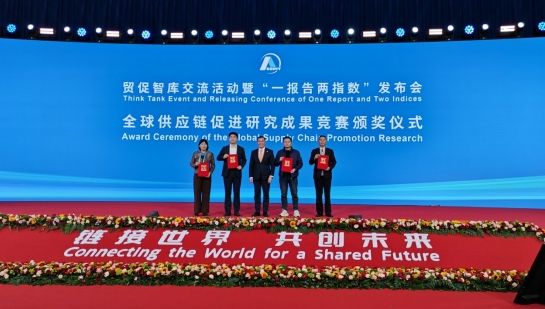The second China International Supply Chain Expo (CISCE) commenced on November 26, featuring a prominent event titled the Trade Promotion Think Tank Exchange. During this event, the “One Report, Two Indices” initiative was unveiled, and an awards ceremony celebrated winners of the Global Supply Chain Promotion Research Competition. Among the recipients, a report titled “Enhancing the Quality of Green Agricultural Supply Chains under China-Pakistan Economic Corridor: A Case Study of the Pakistan-China Chili Project”, co-authored by Professor Song Zhihui from Sichuan University’s Pakistan Study Center and Dr. Liu Yajing from China Agricultural University, secured third place in the Business Advocacy Award category.
Professor Song Zhihui emphasized the strategic importance and practical value of their research on green agricultural supply chains under CPEC. He noted that their case study on the Pakistan-China chili project highlights the pivotal role of green agriculture in enhancing product quality and fostering sustainable development. He further underlined its significance in addressing global environmental challenges and advancing agricultural modernization, reinforcing its impact on global supply chain innovation.
Dr. Liu Yajing acknowledged the recognition by the China Council for the Promotion of International Trade (CCPIT), highlighting that it reflects both the outcomes of their research and the immense potential for agricultural collaboration within CPEC. She stated that this acknowledgment showcases the progress made by enterprises and the opportunities for advancing agricultural partnerships between China and Pakistan.
The research underscored agriculture as a key sector for bilateral cooperation, leveraging the strengths of both nations to tackle economic challenges, boost farmers’ incomes, and promote sustainability. The chili project serves as a model by merging Pakistan’s agricultural resources with China’s advanced supply chain capabilities, creating mutual benefits and significant value.
Addressing challenges in the CPEC supply chain, the study identified logistical hurdles such as insufficient infrastructure, high transportation costs, differing product standards, and limited information-sharing systems. These factors complicate cross-border operations and underscore the need for resilient supply chains in the context of global economic uncertainty.
Moreover, to overcome these obstacles, the researchers proposed solutions including infrastructure upgrades, specialized training for workforce development, investments in e-commerce and digital technologies, and improved policy coordination between the governments of China and Pakistan. These steps aim to enhance efficiency, reduce costs, and strengthen economic ties between the two countries.
The chili project, undertaken by Sichuan Puji Holdings Co., Ltd., is recognized as one of the pioneering agricultural initiatives under CPEC, symbolizing the potential of green agricultural supply chains to drive sustainable development.
Related Posts
Syngenta enhances China-Pakistan agricultural cooperation at CISCE

















